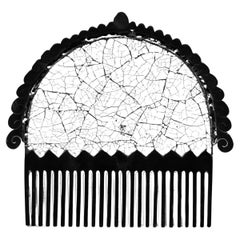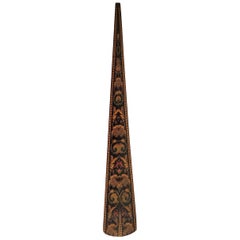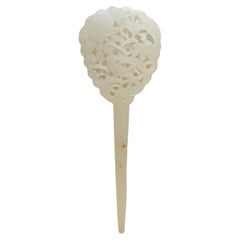Roth Modern Collectible Jewelry
to
1
1
1
1
1
1
1
1
1
1
1
1
1
1
1
Peggy Bannenberg Eggshell Hair Comb
Located in Sharon, CT
Blackened Brass and Eggshell Hair Comb by the Important Modern Dutch
Jewelry Designer/Maker Peggy Bannenberg. This model 'Comb' is in the collection of The Amsterdam Museum Boijmans...
Category
Vintage 1960s Dutch Modern Collectible Jewelry
Materials
Brass
Related Items
Rare 19th Century English Tunbridgeware Hair Pin or Slide
Located in Dallas, TX
PRESENTING an EXTREMELY UNIQUE and RARE 19C British Tunbridgeware Hair Pin/Bobbin or Slide.
This slide is unlike any of it’s kind we have seen before, it is a VERY RARE survivor.
From circa 1860 – 80 and made in Tunbridge Wells, England.
Made of walnut with gorgeous marquetry inlay on the entirety of the front with classic Tunbridgeware micro-mosaic all over the front. The rear is walnut.
The marquetry inlay appears to be various different woods, namely, maple, walnut and satinwood.
Would have been worn in a Lady’s hair bun with the micro-mosaic facing forward.
This would have belonged to a VERY ELEGANT LADY in the mid to late 19th Century.
Tunbridge ware is a form of decoratively inlaid woodwork, typically in the form of boxes, that is characteristic of Tonbridge and the spa town of Royal Tunbridge Wells in Kent in the 18th and 19th centuries. The decoration typically consists of a mosaic of many very small pieces of different coloured woods that form a pictorial vignette. Shaped rods and slivers of wood were first carefully glued together, then cut into many thin slices of identical pictorial veneer with a fine saw. Elaborately striped and feathered bandings for framing were pre-formed in a similar fashion.
There is a collection of Tunbridge ware in the Tunbridge Wells Museum and Art Gallery in Tunbridge Wells.
The famous makers of Tunbridge ware were in the Tunbridge Wells area of Kent; their most notable work was from circa 1830-1900.
Early makers of Tunbridge ware, in Tunbridge Wells in the mid-18th century, were the Burrows family, and Fenner and Co. In the 19th century, around 1830, James Burrows invented a technique of creating mosaics from wooden tesserae. Henry Hollamby, apprenticed to the Burrows family, set up on his own in 1842 and became an important manufacturer of Tunbridge ware, employing about 40 people.
Edmund Nye (1797–1863) and his father took over the Fenner company when William Fenner retired in 1840, after 30 years in partnership with him. Thomas Barton (1819–1903), previously apprenticed at the Wise factory, joined the Nyes in 1836, and worked as Nye’s designer; he took over the business in 1863 and continued there until his death.
In Tonbridge (near to Tunbridge Wells), George Wise (1703–1779) is known to have had a business in 1746. It continued with his son Thomas, and Thomas’s nephew George (1779–1869), who took over in 1806. In its early years the company made articles such as workboxes and tea caddies with prints of popular views; later items had pictures created from mosaics. Their workshop in Tonbridge, Wise’s Tunbridge Ware Manufactory, was next to the Big Bridge over the Medway; the building was demolished in 1886 to widen the approach to the bridge.
Tunbridge ware became popular with visitors to the spa town of Tunbridge Wells, who bought them as souvenirs and gifts. Articles included cribbage boards, paperweights, writing slopes, snuffboxes and glove boxes.
At the Great Exhibition of 1851, Tunbridge ware by Edmund Nye, Robert Russell and Henry Hollamby was shown; Edmund Nye received a commendation from the judges for his work. He exhibited a table depicting a mosaic of a ship at sea; 110,800 tesserae were used in making the picture.
The manufacturers of Tunbridge ware were cottage industries, and they were no more than nine in Tunbridge Wells and one in Tonbridge. The number declined in the 1880s; competent craftsmen were hard to find, and public tastes changed. After the death of Thomas Barton in 1903 the only surviving firm was Boyce, Brown and Kemp, which closed in 1927.
Marquetry was an old technique which was continued by Nye and Barton to create images such as birds or butterflies.
‘Green Oak’ as caused by the fungus Chlorociboria aeruginascens.
Stickware and half-square mosaic was invented by James Burrows in about 1830: a bunch of wooden sticks of different colours, each having triangular or diamond-shaped cross section, were tightly glued together; in the case of stickware, the resulting block was dried, then turned to form an article such as the base of a pincushion. For half-square mosaic, thin slices were taken from the composite block, and applied to a surface.
Tesselated mosaic, was a development by James Burrows of half-square mosaic; it was adopted by George Wise and Edmund Nye. Minute tesserae were used to form a wide variety of geometric and pictorial designs.
Many sorts of wood were used for the various colours; about 40 were in regular use. Only natural colors were used; green was provided by “green oak”, produced by the action of fungus on fallen oak. Designs for articles were often taken from designs of Berlin wool work.
Category
Antique Late 19th Century English High Victorian Collectible Jewelry
Materials
Satinwood, Walnut
Antique White Jade Chinese Hair Pin Finely Carved
Located in Somis, CA
This beautiful white jade hair pin is a work of art. An oval head with scalloped edges is fully carved in three dimensions, showcasing an elegant peasant perched among the branches o...
Category
Early 20th Century Chinese Qing Collectible Jewelry
Materials
Jade
Vintage Leather and Horse Hair Boxing Gloves c.1950-1960
Located in San Francisco, CA
ABOUT
Vintage reddish brown leather boxing gloves filled with horse hair and an extra padding strip on the palms. The leather is very soft and in good condition.
CREATOR Unknow...
Category
Mid-20th Century American Industrial Sports Equipment and Memorabilia
Materials
Leather, Natural Fiber
Peggy Guggenheim Art of This Century Book
By Frederick John Kiesler, Peggy Guggenheim, Max Ernst
Located in New York, NY
Catalog of the seminal avant-garde "Art of This Century" exhibition held at the Peggy Guggenheim Gallery in 1942 and published in an edition of 2500. Edited by Peggy Guggenheim with ...
Category
Vintage 1940s American Modern Books
Materials
Paper
Antique Steiff Long Hair Gold Mohair Teddy Bear ' Alastair' , C. 1900s
By Steiff
Located in West Palm Beach, FL
Antique Steiff Long Hair Gold Mohair Teddy Bear ''Alastair,' C. 1900s
Attributed to Steiff, unmarked, Germany, earlier 20th century
Meet "Alastair," a charming and rare antique teddy bear...
Category
Early 20th Century German Toys and Dolls
Materials
Mohair, Thread
$1,495
H 16.5 in W 10 in D 5.75 in
Filigree Hair Pin Bobby Pin Silver plated Letter Opener
Located in Chula Vista, CA
For your consideration, a filigree hair pin or bobby pin, silver plated. It can be used as a Letter Opener. Unmarked, no information on the maker.
Dimensions: 7 H x 2 W x 1/16 D
Pl...
Category
Vintage 1980s Unknown Bohemian Collectible Jewelry
Materials
Silver Plate
Group of Ancient Roman Bronze Tools & Hair Pins
Located in Philadelphia, PA
A fine group of ancient Roman bronze implements and artifacts.
Consisting of pins & several small scale tools.
From the private collection of Lawrence Majewski, who was a former co...
Category
Antique 15th Century and Earlier Italian Classical Roman Antiquities
Materials
Bronze
19th Century Portrait Miniature of a Young Man with Curly Red Hair
Located in San Francisco, CA
19th century fine portrait miniature of a young man with curly red hair
Dimensions 3" x 2.5". The velvet lined mat measures 3.75" x 5".
The portrait is in very good condition. ...
Category
Antique Late 19th Century British Late Victorian Models and Miniatures
Materials
Paper
Turtleshell hair comb-diadem with chain motif, France 1900.
Located in Milan, IT
Tiara hair comb, in tortoiseshell, topped by an element, also in tortoiseshell, decorated with a sculpted chain motif sloping down from the center towards t...
Category
Early 20th Century French Collectible Jewelry
Materials
Tortoise Shell
Antique Odd Fellows Ceremonial Mask with Hair and Beard c.1900
Located in San Francisco, CA
ABOUT
An antique wire mesh mask used by members of the Odd Fellows organization. Hand painted with red and white painted eyes, cheek bones, nostrils, f...
Category
Early 20th Century Industrial Sports Equipment and Memorabilia
Materials
Metal, Wire
$325 Sale Price
38% Off
H 18 in W 10 in D 8 in
Vintage Leather and Horse Hair Boxing Gloves c.1950-1960
Located in San Francisco, CA
ABOUT
Vintage reddish brown leather boxing gloves filled with horse hair and an extra padding strip on the palms. Vintage repair to one palm padding. The leather is very soft and in...
Category
Early 20th Century American Industrial Sports Equipment and Memorabilia
Materials
Leather, Natural Fiber
19th Century Northern Plains Hair Drop
By Native American Art
Located in Coeur d'Alene, ID
Northern Plains hair drop with red beading with accents on hide, long quilled drops ending in tin cones with red feather fluffs, long black horsehair drop now doubled up on beading.
Period: 19th century
Origin: Great Plains - Northern Plains, Native American
Size: 6" x 35" overall
Family Owned & Operated
Cisco’s Gallery deals in the rare, exceptional, and one-of-a-kind pieces that define the history of America and the Old West. Our pieces range from American Indian to Cowboy Western and include original items of everyday life, commerce, art, and warfare that tamed America’s frontier. Our 14,000 square foot gallery opened in 1996 in beautiful Coeur d’Alene, Idaho.
Personal Service
Cisco’s operates on old fashioned values – honesty and integrity, and all of our items are backed by our money back guarantee. We appreciate the opportunity to earn your business. Whether you desire assistance with a jewelry purchase, choosing a gift, identification, or even selling – we hope to be your trusted source.
Native American, garments, Blackfeet, headdress, collectibles, antiques, Native American beadwork...
Category
Antique Late 19th Century American Native American Native American Objects
Materials
Hide, Beads, Feathers


